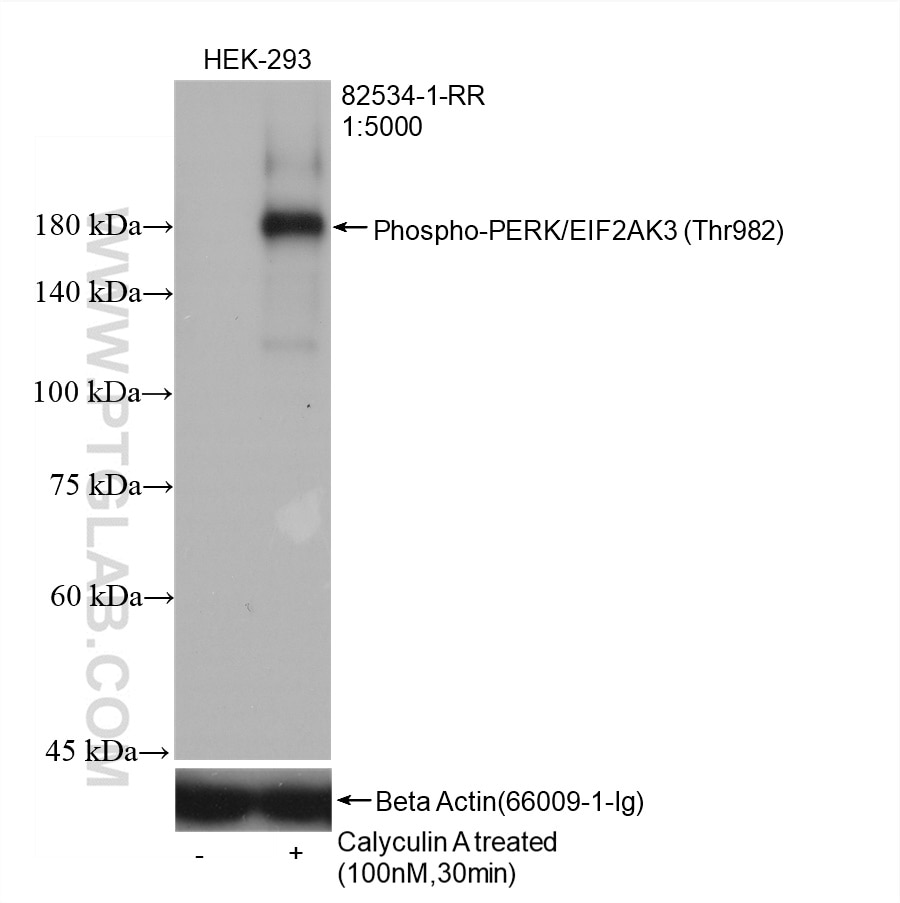Phospho-PERK/EIF2AK3 (Thr982) Recombinant antibody
Phospho-PERK/EIF2AK3 (Thr982) Recombinant Antibody for WB, ELISA
Host / Isotype
Rabbit / IgG
Reactivity
Human
Applications
WB, ELISA
Conjugate
Unconjugated
CloneNo.
4E16
Cat no : 82534-1-RR
Synonyms
Validation Data Gallery
Tested Applications
| Positive WB detected in | Calyculin A treated HEK-293 cells |
Recommended dilution
| Application | Dilution |
|---|---|
| Western Blot (WB) | WB : 1:2000-1:11200 |
| Sample-dependent, check data in validation data gallery | |
Product Information
82534-1-RR targets Phospho-PERK/EIF2AK3 (Thr982) in WB, ELISA applications and shows reactivity with Human samples.
| Tested Reactivity | Human |
| Host / Isotype | Rabbit / IgG |
| Class | Recombinant |
| Type | Antibody |
| Immunogen | Peptide 相同性解析による交差性が予測される生物種 |
| Full Name | eukaryotic translation initiation factor 2-alpha kinase 3 |
| Calculated molecular weight | 1116 aa, 125 kDa |
| Observed molecular weight | 180 kDa |
| GenBank accession number | BC126354 |
| Gene symbol | EIF2AK3 |
| Gene ID (NCBI) | 9451 |
| Conjugate | Unconjugated |
| Form | Liquid |
| Purification Method | Protein A purification |
| Storage Buffer | PBS with 0.02% sodium azide and 50% glycerol pH 7.3. |
| Storage Conditions | Store at -20°C. Stable for one year after shipment. Aliquoting is unnecessary for -20oC storage. |
Background Information
EIF2AK3 encodes the protein kinase RNA-like ER kinase (PERK), a key regulator of the unfolded protein response (UPR) in response to ER stress. Under ER stress conditions, activation of PERK is triggered by the dissociation of glucose-regulated protein (GRP) 78 (also known as BiP) from its luminal domain, followed by oligomerization and autophosphorylation. Phosphorylated PERK subsequently phosphorylates eukaryotic translation initiation factor 2 alpha (eif2α), to attenuate global protein translation and reduce incoming ER protein load via upregulated ER chaperone expression. (PMID: 35922637, PMID: 32029570)
Protocols
| Product Specific Protocols | |
|---|---|
| WB protocol for Phospho-PERK/EIF2AK3 (Thr982) antibody 82534-1-RR | Download protocol |
| Standard Protocols | |
|---|---|
| Click here to view our Standard Protocols |


